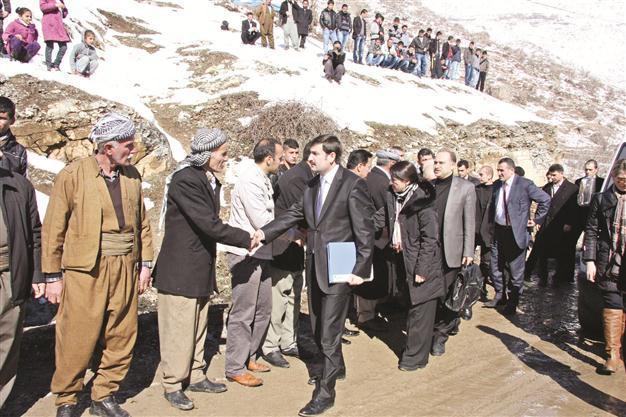Families reject compensation amid parliamentarians’ visit
ŞIRNAK - Doğan News Agency

A group of deputies from each party represented in the Parliament visited Gülyazı village, the site of the Dec. 28, 2011, attack yesterday and met with the victims’ families. AA photo
The families of 34 men killed in a botched air raid in Southeast Anatolia in December 2011 have vowed to reject all compensation from the government until those responsible for the massacre are located and punished.
“We want to say that we will not ask for any kind of compensation from the state and we will reject all compensation until the perpetrators are found and punished,” the relatives said in a letter to Parliament’s Human Rights Inquiry Committee, which was visiting Gülyazı in Şırnak’s Uludere district, the site of the Dec. 28, 2011, attack.
“We are here first to share your grief and wish you condolences, but also to clarify the incident. The investigations are continuing thoroughly, however our Parliament couldn’t ignore what happened. We are here to listen to you,” committee head and Justice and Development Party (AKP) deputy Ayhan Sefer Üstün told victims’ families yesterday in their meeting.
LetterIn their letter, the relatives said the sons of many families had been working as village guards for the past 20 years and that they had been monitoring the border together with soldiers at a nearby post.
The letter said the soldiers knew about the border trading between Turkey and Iraq and were also aware that it was the villagers’ only source of income.
“The Gülyazı military barracks had implicitly allowed our border trade even up to this moment. We have been passing through this border for many years and because the military knew about our actions, they never targeted us in their warning shots. This is the only reason that we never expected such an attack would target our children,” the letter said.
The villagers were bombed after being mistaken for Kurdish militants.
The families also said the soldiers blocked the scene of the incident from all sides on the day and did not allow the villagers to enter the area where the men were killed.
“It is the first time that all the roads that provide entrance to Turkey were blocked on the day of the incident and that no entrance was allowed,” they said.
The families also demanded that the incident be investigated thoroughly and said every officer that watched, evaluated the video footage taken by an unmanned aerial vehicles (UAV) and conducted the bombings should be determined and prosecuted.
Meanwhile, at a conference held by Turkey’s Peace Parliament (Barış Meclisi) in Istanbul on Feb. 4, Ferhat Encü, 28 of whose relatives were killed in the air raid said some of the victims were alive when they found them.
“Thirteen of them were alive when I arrived at the scene but the soldiers who blocked their way before the raid were running away instead of helping us carry them. The injured ones froze to death – we managed to save four of them,” Encü said.
Hikmet Alma, who lost his brother, Nadir Alma, said he did not want to hear a word about the compensation, which has been set at 123,000 Turkish Liras per victim.
“We demand the responsible be put on trial. If help had come, we could have rescued those injured. We demand [to know] the reason why they were ignored,” Alma said.
Hakan Tahmaz, one of the organizers of the conference, said Turkey had experienced a breaking point with the raid.
